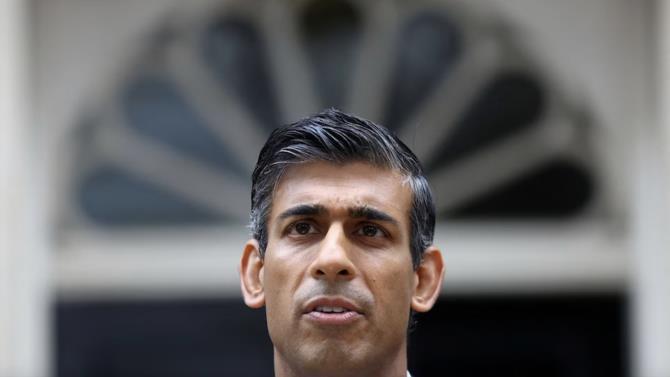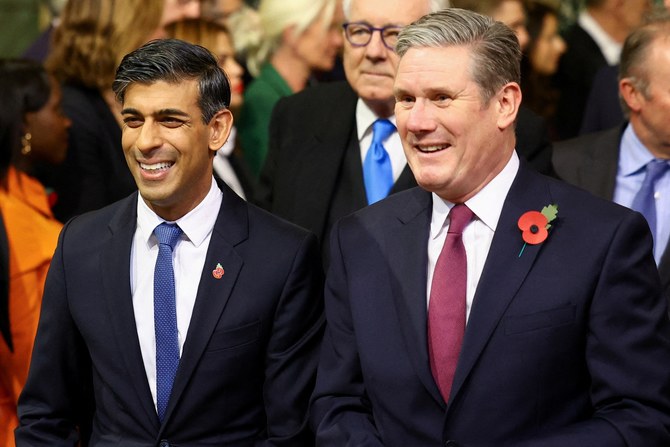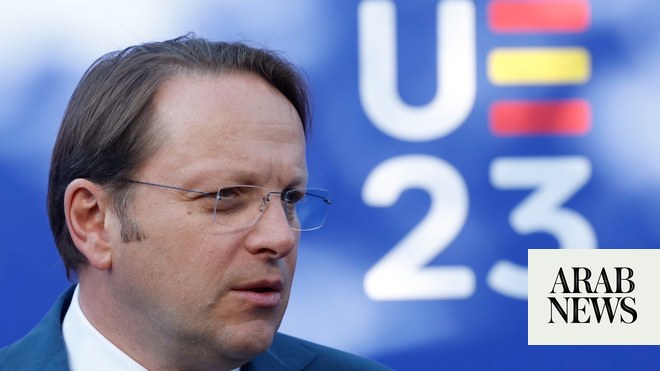
The week between Christmas and new year is traditionally a time for UK politics to take a holiday. However, last Wednesday saw Finance Minister Jeremy Hunt fire the starting gun for the 2024 general election campaign by announcing a March 6 date for his annual budget.
This announcement will fuel speculation that Prime Minister Rishi Sunak could call the election in the first half of 2024. But whatever the timing, the most likely scenario is a significant change in UK politics away from the ruling Conservatives — a shift that will have key international implications, as well as domestic ones.
To be sure, there may be some significant continuity in terms of UK foreign policy to begin with, even if there is a new government. This includes issues such as strong support for Ukraine in its fight against Russia.
However, Labour leader Keir Starmer has said that, if he becomes prime minister, one of his chief priorities would be “the restoration of the United Kingdom and its reputation on the world stage.” His argument is that many people outside of the country feel that it has “turned (its) back on the world, and wherever you go people feel almost the absence of the United Kingdom, once a leading voice, now rarely consulted.”
This could result in a strong relationship between Starmer and US President Joe Biden, in what the Labour leader has called the opportunity for a “progressive moment.” This might even get close to the warmth of relations between Tony Blair and Bill Clinton almost a quarter of a century ago, when they advocated a “third way” between free market capitalism and socialism.
Meanwhile, closer to home in Europe, Labour wants a “much better” Brexit deal with the EU when the current agreement is reviewed in 2025. Starmer believes the current arrangement is “too thin” and he is seeking a closer UK-EU trading relationship.
The fact that Labour is likely to win most seats at the election is shown by recent polls, which indicate that the party could have its biggest electoral success since its landslide wins under Blair in 1997 and Clement Attlee in 1945. The Electoral Calculus prediction tool currently forecasts Labour winning about 459 seats at the general election — a result that would deliver a huge majority.
That may exaggerate the outcome, which would even be in excess of the 1997 and 1945 landslides. To put the 459 number into historical perspective, in the 21 elections since 1945, the winning party has only twice gained as many as 400 MPs. That was Labour in 1997 and again in 2001 under Blair’s leadership.
Prime Minister Sunak still has a steep political hill to climb as he tries to establish himself before going to the polls.
Andrew Hammond
It is still plausible that the polling figures will tighten in the coming months, of course. However, Labour is likely to win more seats than the Conservatives, even if the size of victory is by no means certain to be on a historically epic scale.
Labour’s current big lead highlights not just the success of its leader in restoring confidence after the huge 2019 election loss, but also the growing discontent with the Conservatives, who have ditched four prime ministers in the past seven years, as Brexit and also the COVID-19 pandemic caused major convulsions across the country.
Increasingly, it appears as if Sunak’s position is comparable to that of Prime Minister John Major before the 1997 election. About 18 months before that poll, the Conservatives’ standing was as low as it is today, notwithstanding the economy being in much better health. By the time the general election came, the party had regained modest support but not nearly enough to keep hold of power. It won only 165 seats, less than half the number it had in the previous Parliament, from 1992 to 1997 — but significantly more than the 120 that Electoral Calculus currently forecasts for the Conservatives at the next ballot.
The growing perception that Labour will emerge with the largest number of MPs in Westminster after the next election is encouraging growing numbers of Conservative MPs to announce their retirement from politics, including former Cabinet ministers, such as ex-Defense Secretary Ben Wallace.
However, as bad as the prognosis is for Sunak, he should escape an imminent leadership challenge and is most likely to take the Conservatives into the next election. This is, in part, because of the declining political fortunes of former leader Boris Johnson, who has left Parliament with a hugely tarnished reputation.
But Sunak still has a steep political hill to climb as he tries to establish himself before going to the polls. The task is so difficult because no party in modern UK political history has won five elections in a row — and he must try to do this in the context of a divided Conservative caucus of MPs, high inflation and sluggish economic growth.
Taken together, this is why Labour is tipped to win, potentially in overwhelming fashion. While Sunak is likely to stay as prime minister until then, the political winds are blowing strongly against the ruling Conservatives, dimming their hopes of winning a fifth straight term of office.
Andrew Hammond is an associate at LSE IDEAS at the London School of Economics.












